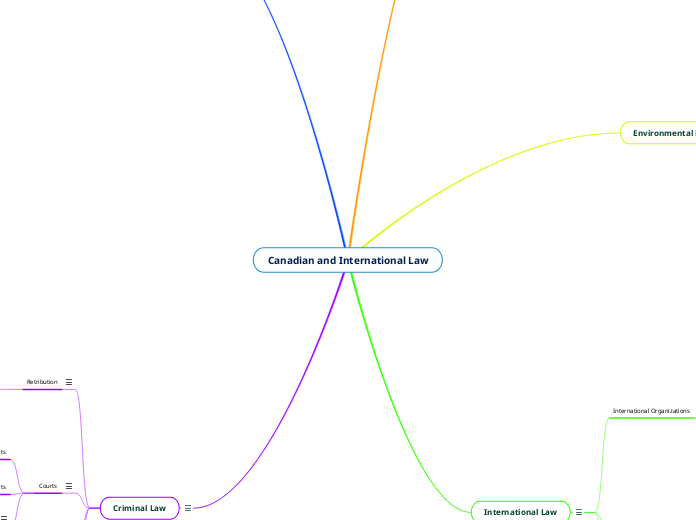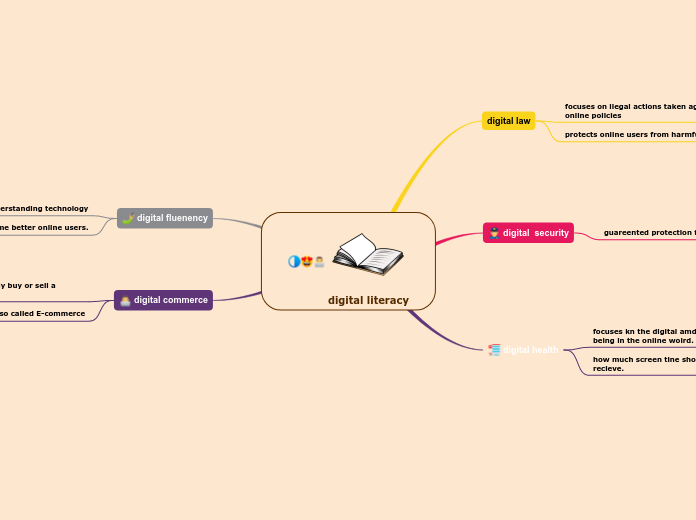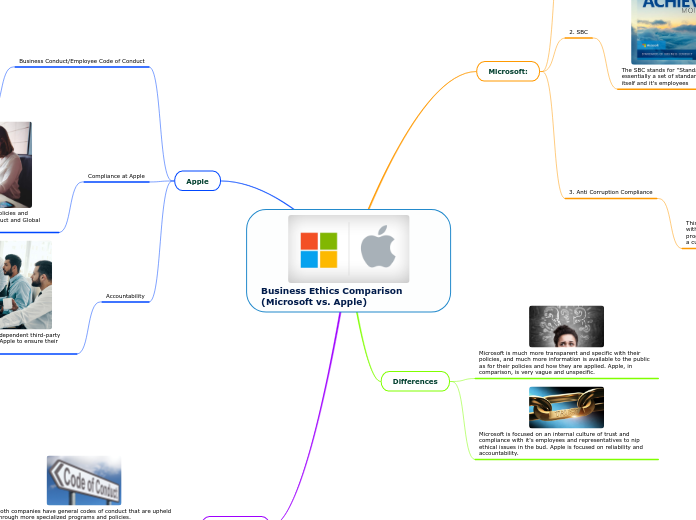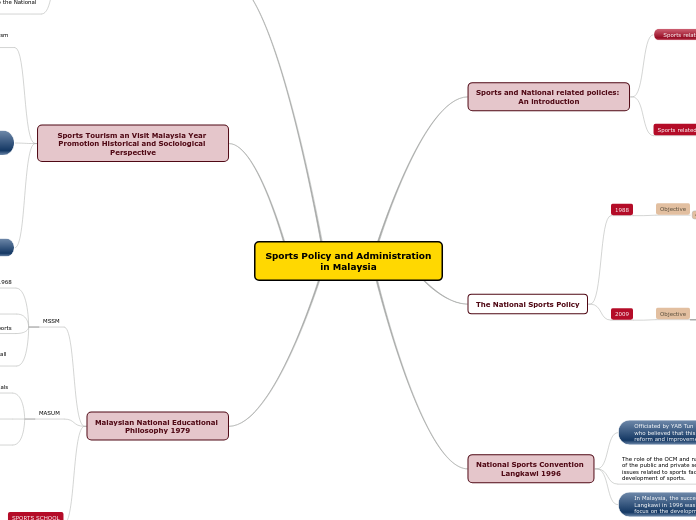Canadian and International Law
Criminal Law
Criminal law is a type of public law that involves individuals and the state. It relates to crime and plays a meaningful role in maintaining a just and peaceful society.
Defence
Defence is an important aspect of criminal law because it is how the defendant acts in their best interest, whether that is pleading guilty or innocent. It is important that trials are fair and that the defendant is given the opportunity to show their innocence and defend themselves.
Negativing vs. Affirmative
An affirmative defence is a type of defence that, if proven, eliminates all of the prosecution's case. An negating defence eliminates one or more elements of the prosecution's case.
Automatism
Automatism is a criminal defence that is used to describe unconscious, involuntary behavior due to the mental state of the defendant. If someone successfully uses the defence of automatism, then they are appealed of all charges and usually sent to a mental institution.
Offence
The offense is what the offender did to violate the law. This is related to criminal law because it is the crime that the offender committed.
Presumption of Innocence
The presumption of innocence means that it is the Crown's responsibility to establish that the accused is guilty of a crime and that the accused must be proven guilty beyond a reasonable doubt. No matter what the offence was, the defendant must be proven guilty.
Indictable Offence
Indictable offences are serious offences that can only be tried in front of a federal court. Indictable crimes include murder, sexual assault, and theft.
Summary Conviction Offence
Summary conviction offences are the most minor offences in the Criminal Code and are less serious than indictable offences.
Courts
Courts are where criminal procedures and trials occur. This is related to criminal law because the judges and jury who decide the verdict are at court.
Jury or Bench Trial
The defendant decides whether they would like a trial by jury or by the judge. When a judge tries the case, it is called a bench trial. When the jury tries the case, it is called a jury trial. This is related to the courts because this occurs in a court of law.
Federally appointed courts
Ontario Superior Court of Justice
Supreme Court of Canada
Provincially appointed courts
Ontario Court of Justice
Retribution
A way to get retribution for a crime is by punishing the offender. This is done by sending them to a detention centre or making them pay a monetary penalty for their crimes.
Sentences
Often, the offender is sentenced to serve a certain time in a detention centre or pay a specific amount of money. To determine the sentence, the mitigating and aggravating factors are considered as well as the victim impact statement.
Victim Impact Statements
Sentences can also be impacted by the victim impact statement, which gives the victim of a crime the opportunity to explain how the crime has affected them.
Aggravating vs. Mitigating Factors
When determining the sentence of the offender, it is important to consider the aggravating and mitigating factors. Aggravating factors make the offence worse and the mitigating factors reduce the blameworthiness of the offence and might result in a lesser sentence. For example, an aggravating factor might be that there was the presence of mens rea (intent) in the crime.
Circle Sentencing
Suspended
Imprisonment
Federal Penitentiaries
Provincial Jails
Depending on the seriousness of their crime, when an offender is convicted of a crime they will be placed in a provincial jail or a federal penitentiary.
Intermittent
Conditional
Fines
The types of punishment include fines, conditional sentences, intermittent sentences, suspended sentences, and imprisonment. Fines are a money penalty one pays for committing an offense, intermittent sentences is a jail sentence that the offender serves in chunks of time, conditional sentences are when a jail sentence is imposed but the judge orders that it be served as probation, suspended sentences is when the offender is convicted but serves the conditions in a probation order, and imprisonment is when the offender is incarcerated for their crime.
Constitutional Law
Constitutional Law is a kind of public law that is designed to regulate the functioning of the government using the Constitution. This is important because Canada is a country that is governed by the Constitution.
Constitution Act, 1982
Originally, Canadian Confederation occurred under the British North American Act. In 1982, Prime Minister Pierre Elliott Trudeau patriated the Constitution and and added a Canadian Charter of Rights and Freedoms, an amending formula, and the rights of Indigenous peoples.
Canadian Charter of Rights and Freedoms
Rights
Under the Canadian Charter of Rights and Freedoms, every Canadian has the right to equality, religion, beliefs, expression, peaceful assembly, and mobility. However, these rights have a reasonable limit and cannot be abused to the point that they are impeding another's ability to practice their rights.
Mobility
Peaceful Assembly
Expression
Beliefs
Religion
Equality
Protections
The Canadian Charter of Rights and Freedoms also guarantees protections against unreasonable search or seizure and against discrimination.
Against Unreasonable Search or Seizure
Against Discrimination
Some examples of discrimination by the government in Canadian history include the Chinese Head Tax, Africville, and Japanese Internment Camps.
Japanese Internment Camps
Africville
Chinese Head Tax
Constitutional Monarchy
As a result of the Constitution, Canada is a constitutional monarchy. This means that Canada recognizes the British monarch; however, they do not rule. The organization of the political system in Canada is heavily influenced by the parliamentary structure of Great Britain.
Democratic
Due to Canada being influenced by Great Britain, it is a Constitutional Monarchy which means that there is a Sovereign as the Head of State. However, the ability to make and pass legislation resides with an elected Parliament.
Representation
Canada's political system is organized is by representation by population. Representation by population is a democratic political system where seats in the legislature or Parliament are allocated on the basis of population. This upholds the principle that all votes should be treated equally. The population votes people to represent their region and those politicians vote on important matters in Parliament.
Petitions
Lobbying
Protesting
Citizens are represented in Parliament and their provincial legislatures by elected officials that are voted in by the general public. Citizens have a right to vote and they also have the right to protest, lobby, and petition a cause. This is a right because it is important that citizens have the ability to hold their political representatives accountable and raise issues that affect their daily lives.
Legislation
In the democratic system, the Parliament or provincial legislatures create legislation which is a written law. Some well known federal legislation includes the War Measures Act which has evolved into the Emergencies Act, The Youth Criminal Justice Act, The Official Languages Act, and The Canada Health Act.
Canada Health Act
Official Languages Act
Youth Criminal Justice Act
War Measures Act
Emergencies Act
Federation
As a result of the Constitution, government powers are split between federal, provincial, and municipal levels. The federal level has jurisdiction over the whole country and the provincial government has jurisdiction over a specific region. The municipal governments have jurisdiction over cities. Different powers are split between different levels of government, for example in Canada, provincial governments are responsible for education and healthcare.
Amending Formula
One of the major consequences of the 1982 Constitution Act was the creation of the amending formula. The amending formula is a set of conditions required to make changes to the Constitution. In the Constitution Act, it states that a constitutional change can be made if seven out of ten provinces that represent at least 50% of the population agree to the change. This is related to federalism because it involves both the provincial and federal governments.
Meech Lake Accord
The Meech Lake Accord is connected to the amending formula because it is an example of a proposed Constitutional amendment that failed because the provinces did not agree.
Charlottetown Accord
The Charlottetown Accord is connected to the Meech Lake Accord because it was the second attempt of Brian Mulroney to amend the Constitution. However, when the accord was put to a public referendum, it failed.
Regional tensions
Federalism has created a lot of regional tensions in Canada. Many people have decentralist views that the provincial governments should have more power than the federal, and oppositely, there are centrist views that believe the federal government should be more powerful than the provincial governments. These tensions have resulted in some provinces wanting more power and autonomy.
Alberta Sovereignty
Alberta sovereignty and the development of their natural resources is related to federalism because most recently, the province has introduced new legislation to become more independent from the federal government. The Alberta Sovereignty Within a United Canada Act is intended to shield the province of Alberta from perceived overreach by the federal government in areas of provincial constitutional jurisdictions.
Development of Natural Resources
Quebec Quiet Revolution
The Quiet Revolution in Quebec, the FLQ, and both Quebec Referendum are events that took place in the 1960-1990s due to regional tensions and the Constitution. Quebec was frustrated and betrayed because they were the only province who did not sign the Constitution and they also wanted to be separated from the rest of Canada to form their own nation. This was an issue related to federalism because Quebec wanted to leave the country and form their own independent government.
Quebec Referendum
FLQ
Indigenous Affairs
Section 35 of the 1982 Constitution Act recognized the existing Indigenous and treaty rights of the Indigenous peoples in Canada.
Indian Act, 1879
The Indian Act was introduced in 1876 with the purpose of assimilating the Indigenous population in Canada into Western society. They did this by creating Residential Schools, Indian Status, and placing Indigenous peoples on reserves where the land had little economic potential. This is connected to the Indigenous rights that were in the 1982 Constitution because Prime Minister Trudeau recognized the injustices and policies of assimilation that Indigenous peoples in Canada faced and he tried to minimize the harm created by the Indian Act. However, today, the Indian Act continues to be a controversial act in the Constitution.
Resource Development
The Indian Act also governs resource development in regards to Indigenous peoples.
Indian Status
Under section 12 of the 1951 Indian Act, a First Nation woman who marries a non-First Nation man would lose her and any of her future children’s Indian status. If their spouse abandoned them or died, her status would be taken away because it was conditional on the husband. Furthermore, the act removed status from a woman if her mother or paternal grandmother was not registered as First Nation before they were married.
Intergenerational Trauma
The policies of assimilation (Indian Status, Residential Schools) which were legalized by the Indian Act created a lot of intergenerational trauma in Indigenous communities that continues to be felt today.
Land Ownership
There are specific land claims that concern the government's obligations from the Indian Act.
Specific Land Claims
Comprehensive Land Claims
There are two types of land claims: Comprehensive land claims are based on the traditional lands of the Métis, First Nations, and Inuit peoples who did not sign treaties. Specific land claims regard the failure of the government to fulfill its obligations under the Indian Act.
International Law
International law is the set of standards, treaties, rules, and norms that are followed by nations.
Foreign Affairs
Foreign affairs are matters that have to do with international relations and serve to advance the home country's place on the international stage. This relates to international law because the foreign affairs department communicates with other countries and creates agreements.
Treaties
Treaties are formal, legally binding agreements between countries. This is related to foreign affairs because countries have to work together to agree on a set of terms. They have to consider what is in their best interests, and what the other country might agree to as well. Treaties help develop dialogue and foster positive relationships between nations.
Multilateral
There are two types of treaties: Bilateral and Multilateral. Multilateral treaties are a type of treaty that is between many countries.
Bilateral
There are two types of treaties: Bilateral and Multilateral. Bilateral is a type of treaty that occurs between two countries.
Free Trade
Free trade in Canada is connected to foreign affairs because it was an international agreement that was between Canada, the United States, and Mexico.
Globallization
Free trade contributed to globalization because it promoted global economic growth, created jobs, made companies more competitive, and lowered prices for consumers. In addition, it fostered a more positive relationship between Canada and the United States.
Importing
Importing is when goods are produced from abroad and then transported to Canada. This is related to globalization and free trade because products from other countries are purchased. If there was no globalization or trading between countries, then the economy would be smaller and there would be a focus on domestic industry.
Exporting
Exporting is when goods or resources are produced in Canada and then transported to another country. This is related to globalization and free trade because products are being purchased and sent to other countries. If there was no globalization or trading between countries, then the economy would be smaller and Canada would not have as close relations with other countries.
Extradition
Extradition is when one state surrenders an individual to another country for prosecution or punishment. This is related to foreign affairs because the government must participate and decide whether or not to send the individual to another country to face prosecution. Usually, a treaty or arrangement is made between the two countries.
Vienna Convention
The Vienna Convention was an international treaty established in 1961. It is important to international law because it outlines the functions and protections of a diplomat.
Diplomatic Immunity
Under the Vienna Convention, a diplomat is exempt from the laws of a foreign jurisdiction and are immune from criminal prosecution and civil lawsuits.
Inviolable Property
Under the Vienna Convention, the private residence, papers, correspondence, and property of diplomats cannot be confiscated and are considered "inviolable."
International Organizations
International organizations are an important part of international law because they uphold the standards, treaties, and agreements between nations. If there were not international organizations, then there would be no way to hold nations accountable for their actions. There are three major international organizations, the United Nations and the International Criminal Court.
UN
The main bodies of the United Nations are the General Assembly, Security Council and the International Court of Justice.
Collective Security
An important effect of the United Nations is the idea of collective security. This means that if one state is an aggressor of another state, then it is considered an aggressor of all the states. This helps prevent wars and promotes international cooperation.
UDHR
The UN created the United Nations Declaration of Human Rights (UDHR) which was the first international document to list and protect fundamental human rights.
ICJ
Security Council
General Assembly
ICC
The International Criminal Court is an independent international organization that tries individuals who are charged with committing the gravest and most serious crimes of concern to the international community.
War Tribunals
In the ICC, a war tribunal often takes place in order to determine the guilt of the defendant. Representatives from various member states hear the case and come to a verdict. Some of the most notable ICC tribunals were the Rwandan Genocide Tribunal and the International Tribunal for the former Yugoslavia.
Yugoslavia
Rwanda
Environmental Law
Environmental law is a type of public law that creates laws concerning the protection and conservation of the environment. This is an important type of law because in Canada there are many natural resources that need to be managed correctly and with caution. Environmental law can be separated into two categories: Individual rights and the Government's actions. Individual rights are the extent to which an individual can take legal action to protect the environment and the government's actions are their responsibilities to protect the environment.
Government Actions
Premier Mike Harris
What environmentalists would consider a step backwards in government action occurred in 1995 when Ontario conservative Mike Harris was elected as Premier. He introduced many environmental policies that focused on self regulation and voluntary compliance. Self regulation is the idea that organizations must monitor their environmental standards/ethics instead of a government enforcing them. Voluntary compliance is when regulated parties meet requirements without the province initiating enforcement actions.
Voluntary Compliance
Self Regulation
Environmental Bill of Rights 1993
Environmental Assessment Act 1975
Environmental Protections Act 1971
The Environmental Protections Act 1971, Environmental Assessment Act 1975, and the Environmental Bill of Rights 1993 are important actions that the Ontario government took to regulate pollution.
Individual Rights
Riparian Rights
Riparian rights are the rights of owners of lands that border a body of water not to have the quantity or quality of that water negatively affected by others. If the individual's riparian rights are violated, they can take legal action.
In an environmental case, the individual has the right to sue someone for an intentional tort. An intentional tort involves intentional and direct interference with another's land without their express or implied consent. There are two types of intentional torts which are private nuisance and public nuisance. Private nuisance involves unreasonable interference with another's land and public nuisance involves the interference with a public right such as the right to fish or hunt.
Public Nuisance
Interfering with right to fish, hunt
Private Nuisance
Foul Smells
Soil Contamination
Noise
Individual vs. Collective Action
An individual has the right to take action to protect the environment. However, it is important to realize that people can make a bigger environmental impact when they work together rather then when they work apart.
Private Law
Private law is a type of law that involves the relationship between individuals.
Labour Law
Labour law is a type of private law that mediates relationships between workers, trade unions, the government, and employers.
Estate Law
Estate law is a type of private law that concerns assets, which include properties, wills, wealth, and the distribution of assets.
Tort Law
Tort law is a type of private law that provides compensation for people who have been wrongfully injured or whose property has been damaged. There are two types of torts, unintentional and intentional. Unintentional torts occur due to negligence and intentional torts are wrong deliberate acts that are perpetrated against the claimant.
Intentional Torts
Deliberate Acts
Unintentional Torts
Negligence
Family Law
Family law is a type of private law that deals with family matters and domestic issues between individuals.
Civil Law
Civil law is a type of private law that outlines the rules about settling disputes between individuals.









